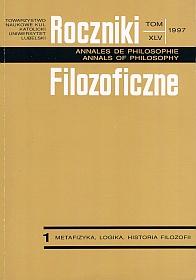Kantowska teoria umysłu
Abstrakt
Kant has not presented a separate discussion dealing with the nature of mind in the Critic of Pure Reason. The paper seeks to reconstruct the main elements of Kant’s theory on that, leaving to the side broader epistemological and metaphysical issues with which it is usually connected. First the author discussed the most important concepts characteristic of Kantian approach to the nature of mind: the concept of empirical and transcendental apperception, and the concept of synthesis. The main part of the paper analyses Kant’s arguments against the fallacies in reasoning (paralogisms) of so-called rational psychology. The following errors have been discussed here: paralogism of substantiality, noncomplexity and personality. The author has formulated objections to each of Kant’s arguments against a possibility of proof for the existence of substantial, immaterial and indestructible human soul. Further part of the paper is devoted to the nature of the so-called noumenal object. Two interpretations of Kant’s standpoints have been given here, ie his so-called official standpoint, according to which the subject of apperception is identical to the noumenal object, and his standpoint from the Paralogisms, wherein Kant claimed that apperception is only a consciousness of the very activity of thinking, and not a consciousness of the noumenal subject. In this context the author discusses P. F. Strawson’s criticism of Kantian theory of atemporal subject. The last part is devoted to the relationship between Kantian theory of mind and some current standpoints in contemporary philosophy of mind. The author considers the question whether Kant can be regarded as a protofunctionalist and whether his theory of mind can be reconciled with materialism.
Copyright (c) 1997 Roczniki Filozoficzne

Utwór dostępny jest na licencji Creative Commons Uznanie autorstwa – Użycie niekomercyjne – Bez utworów zależnych 4.0 Międzynarodowe.





